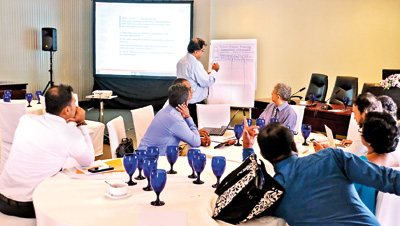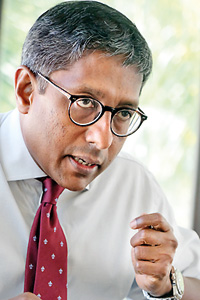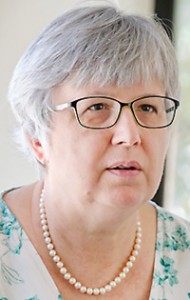News
New National Medicines Policy on the cards
Five groups engaged in earnest discussion over two days at a Colombo hotel this week – the kick-off of a crucial and long overdue process to revise the National Medicinal Drug Policy (NMDP) 2005 of Sri Lanka, to ensure safe and quality medicines for patients.

Putting their heads together, some of the groups discussing issues. Pix by Amila Gamage
The target of the brainstorming was to lay the groundwork for the proposed National Medicines Policy (NMP) Sri Lanka (2020-2025) and the Strategic Implementation Plan (2020-2021). By April 2020, the NMP is to be handed over to the Health Minister to be submitted for Cabinet approval, the Sunday Times understands.
The ‘roadmap’ for this process was launched with the Kick-off Workshop this Tuesday and Wednesday and will be followed by the preparation of the first full draft by February next year which, in turn, will be looked at closely by the relevant stakeholders including the public in March, it is learnt.
The objectives of the NMDP revision is to align the NMP with the National Health Policy 2020-2025 and prepare a detailed Strategic Implementation Plan with targets as per the NMP goals; the proposed outputs, activities, timelines and roles/responsibilities; the necessary resources and budget; and the monitoring and evaluation mechanisms.
The National Medicines Regulatory Authority (NMRA) headed by Prof. Asita de Silva is the focal point for the revision of the NMDP 2005, while the World Health Organization (WHO) is extending the services of Prof. Hans V. Hogerzeil, Emeritus Professor of Global Health at Groningen University (Netherlands) and Co-Chair of the Lancet Commission on Essential Medicines to help the revision process along with Dr. Klara Tisocki, Regional Advisor – Essential Drugs and Other Medicines, Department of Health Systems Development, WHO – Regional Office for South-East Asia.
The local Consultant who will guide the process is reputed health expert Dr. Palitha Abeykoon and the Coordinator is Ms. Chinta Abayawardana.
“The NMP will spell out the key goals, while the Implementation Plan will set out the specific details,” said Dr. Tisocki, with Prof. Hogerzeil pointing out that it was back in 1978 that Sri Lanka brought in an NMP, one of the first countries to do so ahead of the rest.
“Sri Lanka is also well known as a ‘pragmatic country’ which is doing well with little money. However, this relative advantage with regard to basic medicines seems to be slipping away with some countries in the region such as Thailand doing better,” he said.
Referring to challenges that countries face, Prof. Hogerzeil said they include an increased demand from the public for expensive medicines.
Governments have to deal with such demands and evaluate them, while balancing what to pay for and how to get the best out of the process.
Dr. Tisocki said a National Medicines Policy is broad and covers all aspects of universal access to essential medicine. It is a high-level commitment on the part of the government to ensure access to medicines, which is an entitlement and a right of the patients, while making sure that production, distribution, consumption and quality assurance happen smoothly.

Prof. Asita de Silva

Prof. Hans V. Hogerzeil

Dr. Klara Tisocki
Explaining the backdrop in which the workshop took place, NMRA Chairperson Prof. de Silva said that in 2019, the Health Ministry felt that revisions to the NMDP 2005 were a dire necessity and long overdue, as usually, the policy should be revised every five years.
Earlier, in February 2018, the NMRA had voluntarily sought a WHO benchmarking assessment with regard to the level of ‘maturity’ of the regulatory process. This rigorous assessment – by the WHO’s Regulatory Systems Strengthening (RSS) unit based in Geneva – of the country’s regulatory function had been sought for the first time by Sri Lanka.
“More than 50% of the countries are deemed as having ‘immature regulation oversight’ and strengthening the regulatory process is vital to ensuring that patients have better quality medicines,” said Prof. de Silva, reiterating that the RSS unit’s assessment is a hand-holding exercise rather than a policing one, to improve the system.
It was after complete digitalization that the NMRA focused on the quality of regulatory oversight, it is understood.
A 12-member team from the RSS unit had visited Sri Lanka five to six times for inspection, the last being in October this year.
“The final report from the WHO in this assessment is due early next year, but the NMRA has been informed of the findings – that the regulatory regime in place is strong but that some processes have not been implemented to reach a high level of maturity. As such, ‘maturity is not at optimal levels’,” said Prof. de Silva.
The WHO has recommended 194 institutional development points of which 26, including the setting up of a National Laboratory to conduct quality testing, have been prioritized. The NMRA is hoping to complete some in 3-4 months and most including the laboratory in two years, he assures.
He added that the Strategic Implementation Plan that they are hoping to bring out along with the draft NMP through the process begun this week will be based on the 194 institutional development points.
Medicine policy documents have been developed and used in Sri Lanka since the 1970s and in 1991 and 1996, full national medicine policies were drafted but not adopted officially. In 2005, the latest NMDP had been issued with the three objectives of: promoting the availability and affordability of efficacious good quality essential medicines relevant to the population in a sustainable and equitable manner; promoting the rational use of medicines by professionals and consumers; and promoting local manufacture of essential medicines.
| Proposed NMP based on Essential Medicines Concept | |
| The objectives of the NMP being drafted now are:
While being within the overall health policy of the country, the proposed NMP is to be based on the Essential Medicines Concept and safeguard the rights of the patients/consumers and cover all systems of medicine including allopathic, homeopathy, ayurveda, siddha, unani and any other, with policies for these systems being developed in consultation with the relevant stakeholders, the Sunday Times learns. The proposed NMP is to have the following elements – selection of essential medicines; affordability and equitable access; financing options; supply systems and donations; regulation and quality assurance; quality use of medicines; research; human resources; viable local pharmaceutical industry; and monitoring and evaluation. It envisages the setting up of a National Standing Committee appointed by the Health Minister on the recommendation of the Director-General of Health Services and comprising all stakeholders to oversee the implementation of the NMP. Those participating in drafting the new NMP include Health Ministry medical administrators; NMRA staff; those from the State Pharmaceuticals Corporation (SPC), the State Pharmaceutical Manufacturing Corporation (SPMC) & the Medical Supplies Division (MSD); professional organizations/colleges of doctors; pharmacists & nurses; academic staff of universities; patient groups; Food and Drug Inspectors; those from the Sri Lanka Pharmaceutical Manufacturers’ Association (SLPMA) & the Sri Lanka Chamber of the Pharmaceutical Industry (SLCPI); the Finance Ministry; the Consumer Affairs Authority; and the WHO according to a list given to the Sunday Times.
|

